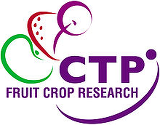RefERENCE: CTP_FCR_2020_9
Supervisors: Dr Mark Else (NIAB EMR), Dr Andrew Simkin (NIAB EMR), Prof Tracy Lawson (University of Essex)
This student will be registered with the University of Essex. Beginning in October 2020, the successful candidate should have (or expect to have) an Honours Degree (or equivalent) at 2.1 or above in Plant Biology, Plant Physiology or Molecular Biology.
Background
There are many factors that combine to influence marketable yields and berry quality of cane crops. Although many growers acknowledge the impact of short-term and unintended drought events on berry size, few recognise the possible longer-term consequences for berry quality and flavour. We have shown in raspberry and blackberry crops that a significant and prolonged depression of photosynthesis occurs following even mild stress events, and this can be expected to impact on berry size and flavour long after the stress has subsided. Similarly, midday stomatal closure triggered by high evaporative demands and insufficient root water uptake could limit crop productivity on a near daily basis during hot weather.
Objectives and approaches
The student will investigate the stress-induced stomatal and metabolic inhibition of photosynthesis and identify the hydraulic and chemical signals that regulate these legacy effects as the plant recovers from short-term and more severe stress episodes. An improved understanding of these post-stress signalling systems will help us to identify ways in which leaf gas exchange can be optimised more rapidly during the stress recovery phase. Our aim in the over-arching research programme is to improve berry crop resilience to combined environmental stress events that are already more prevalent in the changing UK climate.
The study will employ gravimetric measures of hydraulic conductance combined with IRGA measurements of stomatal behaviour and transpiration that have recently been established at the University of Essex, along with some of the combined imaging approaches developed in the Lawson lab as well as utilizing the growth cabinets, GroDome, polytunnels and data-driven precision technologies developed at NIAB EMR for the commercial production of soft fruit cane crops.
Training
The studentship will provide advanced training in crop physiology, photosynthetic adaptation, assessments of fruit quality, growth analysis and use of IRGAs and chlorophyll fluorescence as well as experimental design and statistical analysis. You will work in a supportive group composed of molecular biologists, biochemists and plant physiologists.
Application
Anyone interested should return the application and equal opportunities forms to recruitmentctp@emr.ac.uk citing the reference before the deadline of 28th February 2020.
For this specific studentship, we may consider other students not eligible for Research Council funding; however, the candidate must be able to pay additional tuition fees charged by the University of Essex.
Contact Dr Mark Else (mark.else@emr.ac.uk) for an informal discussion.
